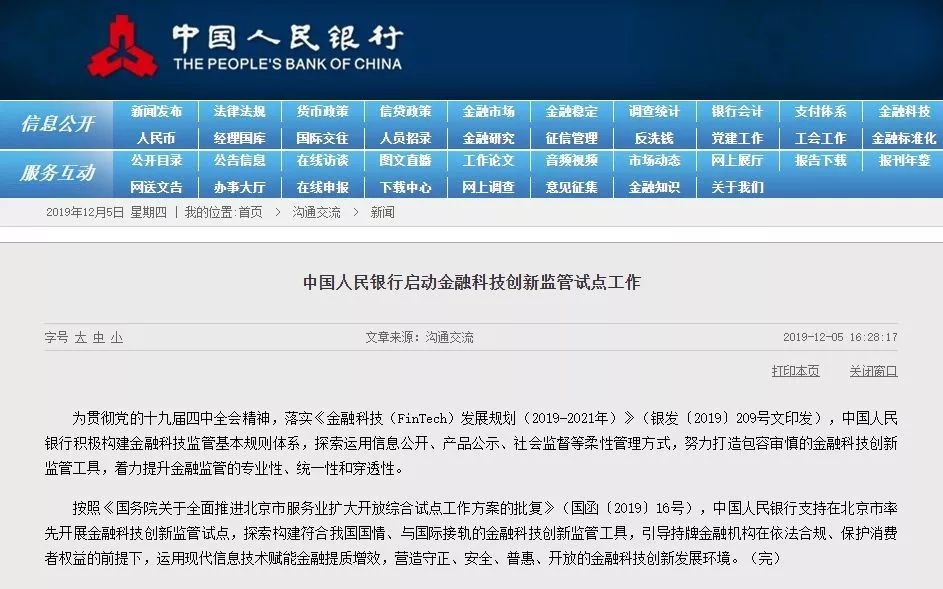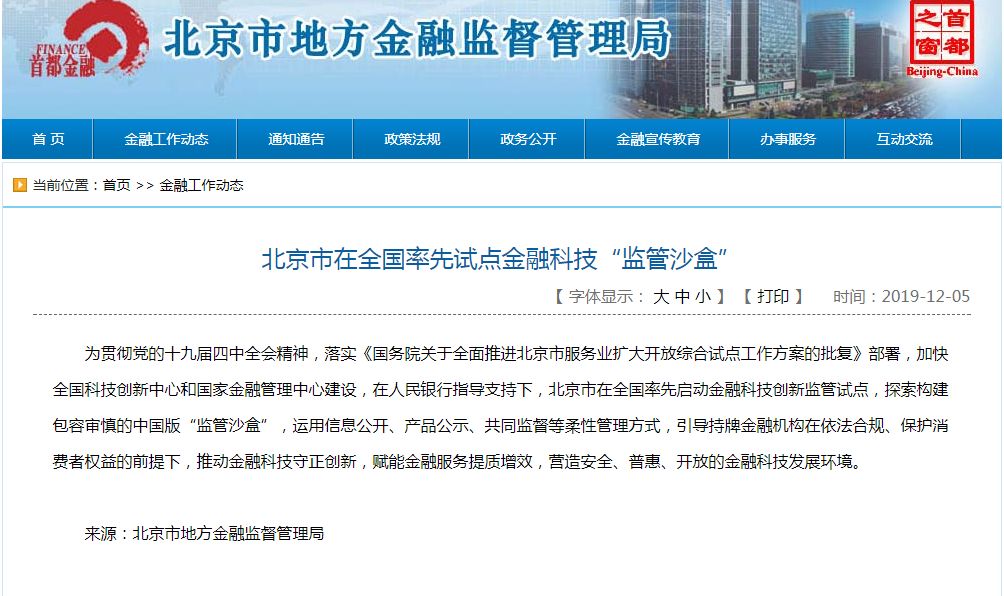Central Bank: Supports Pioneering Pilot Fintech Innovation Supervision Pilot in Beijing
Original: Share Finance Neo
Source: Shared Finance
On December 5, according to the official website of the central bank, in accordance with the "State Council's Reply on the Comprehensive Pilot Work Plan for Comprehensively Promoting the Opening-up of Beijing's Service Industry", the central bank supported the first pilot pilot of fintech innovation supervision in Beijing and explored the construction of a project that is in line with China's national conditions, and An internationally-accepted fintech innovation and supervision tool guides licensed financial institutions to use modern information technology to empower finance to improve quality and efficiency under the premise of complying with laws and regulations and protecting consumer rights and interests, and to create a ethical, safe, inclusive, and open finance. Development environment for scientific and technological innovation.

- SheKnows 丨 self-evolution, how does the public chain lead technological innovation?
- Gao Jian, former executive vice president of China Development Bank: Blockchain is hot, but contains many elements of a future bubble
- The "Internet of Things + Blockchain" market research report has been released. So many companies have already used it?
The central bank said that in order to implement the "FinTech Development Plan (2019-2021)", actively build a basic system of financial technology supervision, explore the use of flexible management methods such as information disclosure, product disclosure, social supervision, and strive to create an inclusive and prudent Fintech innovates regulatory tools and strives to enhance the professionalism, uniformity and penetration of financial regulation.
According to the reporter, as of now, in the fintech pilot work, Beijing has approved 46 fintech pilot projects, ranking first among the ten pilot provinces and cities. At present, Beijing has gathered more than 100 fintech companies, achieving annual The income is nearly 100 billion yuan.
Shortly after the announcement by the central bank, the official website of the Beijing Municipal Financial Supervision Administration (hereinafter referred to as the "Beijing Financial Supervision Bureau") issued a message saying that in order to implement the spirit of the Fourth Plenary Session of the 19th Central Committee of the CPC, The "Response of the Municipality's Service Industry to Expand the Comprehensive Pilot Work Plan" was deployed to accelerate the construction of the National Science and Technology Innovation Center and the National Financial Management Center. With the guidance and support of the People's Bank of China, Beijing took the lead in launching financial technology innovation supervision pilots in the country to explore the construction of an inclusive and prudent Chinese version of "regulatory sandbox".

The Beijing Financial Supervision Bureau stated that it will use flexible management methods such as information disclosure, product disclosure, and joint supervision to guide licensed financial institutions to promote fintech innovation and compliance, and empower financial services to improve on the premise of legal compliance and protection of consumer rights. Quality and efficiency, and create a safe, inclusive and open financial technology development environment.
It is understood that the regulatory sandbox system, which is one of the fintech innovation testing mechanisms, has ushered in new progress and has recently been included in the "Bayi Project" to promote the development of fintech in Beijing. Sun Shuo, deputy secretary of the Xicheng District District Committee and mayor of Beijing, revealed that the sandbox monitoring mechanism will be implemented in Xicheng.
Pilot fintech will be launched in multiple places to supervise the sandbox
In July this year, Li Wei, the director of the Central Bank ’s Science and Technology Department, disclosed in a public speech that the central bank will, together with other ministries and commissions, launch fintech application pilots in 10 provinces, including Beijing, Shanghai, and Guangzhou.
Data show that in the current fintech pilot work, Beijing has approved 46 fintech pilot projects, ranking first in 10 pilot provinces and municipalities. Beijing has a total of more than 100 fintech companies, and has achieved an annual income of nearly 100 billion yuan.
In addition to the official announcement by Beijing that it wants to explore the Chinese version of the "regulatory sandbox", in fact, the "regulatory sandbox" has blossomed everywhere.
Previously, He Xiaojun, the director of the Guangdong Local Financial Supervision Bureau, said that Guangdong would further encourage innovation, deepen business integration with Hong Kong and Macau in virtual banking, open up data barriers, and innovate the use of digital currency scenarios to better serve modern financial technology. Construction and development of the entire Greater Bay Area. Guangdong will also improve the regulatory cooperation mechanism with the financial management departments of Hong Kong and Macao, explore a financial supervision system with a regulatory sandbox as its core, and provide the best environment for the spread and application of modern financial technology.
In a series of blockchain and digital asset forums recently held in Hainan, Chen Yang, director of the Hainan Provincial Financial Supervision and Administration Bureau, also said that Hainan will introduce a regulatory sandbox model. At the same time, relying on the regulatory sandbox, Wang Lu, deputy governor of Hainan Province, expressed the hope that Hainan will be built into a digital asset trading demonstration zone.
Zhu Zhongwen, deputy director of the Reform and Development Bureau of the Management Committee of the Xiong'an New District of Hebei, revealed that a “financial island” with a total land area of about 2.5 square kilometers will be constructed in the Xiong'an area of the Hebei Free Trade Zone, and will explore a “sandbox mechanism” for financial supervision. Zhang Yong, a researcher at the Shanghai Free Trade Zone Comprehensive Research Institute of Fudan University, said that the financial island is expected to become the core area of Xiong'an CBD. "The financial island will be built into a centralized hosting place for financial institutions and a fintech innovation center." Zhu Zhongwen said, "Xiongan District will build a financial demonstration zone, and explore and monitor the 'sandbox mechanism' under the premise of law and regulations. Support the trial of equity crowdfunding on the Xiong'an Equity Exchange. "
Recently, Guo Weimin, the chief scientist of Bank of China, also stated that China can launch STO within the strict regulatory sandbox mechanism.
It is worth mentioning that not long ago, the People's Bank of China released the "China Financial Stability Report (2019)", which mentioned digital currency, Libra, blockchain technology, and the rectification of virtual currency exchanges.
In the column "Fintech development trends", the report pointed out that in recent years, fintech has developed rapidly. Whether it is the use of big data, artificial intelligence to innovate financial services, or the research and development of digital currencies, it reflects the deep integration of finance and technology. Trends have a profound impact on the real economy and the financial system, and balancing the relationship between risk and innovation has become a common issue facing global financial regulation.
From the perspective of development trends, the development of fintech in the past ten years has prominently manifested on the one hand the rise of various new payment instruments, and technology companies represented by Internet platforms and communication companies have poured into the global financial services market; on the other hand, financial Institutions actively use technologies such as automation and decentralization to improve internal operating efficiency and financial service quality. The report mentioned that at present, there are opinions that some financial services and some financial infrastructure provided by commercial banks and central banks may be replaced by new companies, automated procedures and decentralized networks in the future. For example, Facebook recently proposed the idea of digital token Libra, which has aroused widespread concern in the international community.
This time, the central bank set Beijing as a pilot for fintech innovation supervision, which is undoubtedly in line with the fintech development trends mentioned in the report. As stated in the report, China has made significant progress in the development of fintech and has a global leading edge in local market segments. However, some risks have also been generated and exposed during the rapid development of fintech. In the next step, China should, on the basis of summarizing international fintech supervision experience, closely integrate with China's reality, grasp the global fintech development trend, accelerate the improvement of the existing regulatory framework, and innovate the regulatory model and means, while respecting market principles and encouraging innovation. Actively and effectively prevent and control financial risks, seek benefits and avoid harm, and promote the healthy development of financial technology in China.
We will continue to update Blocking; if you have any questions or suggestions, please contact us!
Was this article helpful?
93 out of 132 found this helpful
Related articles
- Babbitt site 丨 When the “Belt and Road” meets the digital economy and blockchain, watch the representatives of all countries reveal the truth for you
- Ethereum difficulty bomb explodes and dismantles
- Li Lihui, Former President of Bank of China: China may become the first country in the world to launch fiat digital currency
- National University of Singapore Visiting Professor Bai Shihuan: How Singapore Regulates FinTech
- Ethereum Istanbul hard fork soon, major client node upgrade rate is less than 40%
- Commercial banks explore the way "blockchain +"
- Smartphone TEE: Booster for DC / EP offline applications of central bank digital currencies





